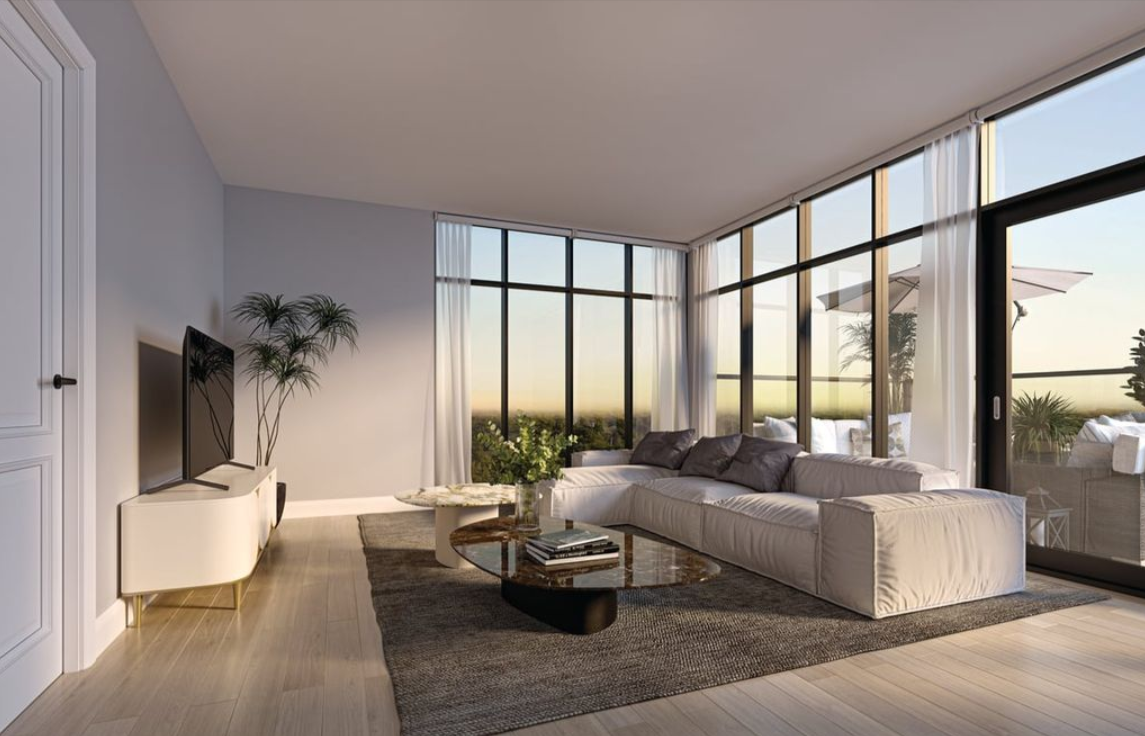
Homebuyers and investors have increasing opportunities to choose new properties that integrate advanced green technologies, ranging from renewable energy systems and high‑performance building envelopes to water‑saving strategies and smart monitoring tools. These options include mass‑timber construction for carbon sequestration, ground‑source geothermal heating and cooling, solar‑ready infrastructure, rainwater harvesting and greywater recycling, energy‑recovery ventilation, and digital sub‑metering for real‑time consumption tracking.
These features are important, not only for sustainability, but because they can lower operating costs and improve indoor air quality. For investment properties, the ability to reduce environmental footprints and offer greener urban living, without compromising design or comfort, can also help justify higher rents.
Notable developments such as Pura in Surrey, Ōku on Vancouver’s West Side, Bellwoods House in Toronto, Garden 11 in East Vancouver, and Gemini Condos in Oakville are key properties embracing this trend. Each project employs a distinct combination of mass‑timber construction, high‑performance building envelopes, smart energy and water management systems, and renewable‑energy‑ready infrastructure to achieve lower carbon emissions, improved air quality, and greater resource efficiency.
Overview of Key Eco‑Features
| Feature | Pura (Surrey) | Ōku (Vancouver) | Bellwoods House (Toronto) | Gemini Condos (Oakville) | Garden 11 (Vancouver) |
|---|---|---|---|---|---|
| Structure | CLT (SmartWood®) | Concrete with high‑perf walls | Heritage masonry adaptive reuse | Concrete + geothermal loops | Conventional + high‑perf envelope |
| Carbon Impact | -66% emissions vs. steel | Zero‑emission target | Demolition avoidance | Geothermal reduces fossil use | Biogenic gardens; PV‑ ready roof |
| HVAC | Efficient forced air | VRF system | Energy‑recovery ventilation | Geothermal heating/cooling | Standard HVAC + ERV |
| Water Conservation | Low‑flow fixtures | Stormwater management | Rainwater harvesting | Low‑flow fixtures | Smart irrigation; rainwater reuse |
| Monitoring & Controls | — | Home sub‑meters | SmartONE digital controls | Smart thermostats | Greenhouse sensors; irrigation controls |
| Renewables | Timber (carbon sequestering) | Stormwater reuse | ERV energy recovery | Geothermal loops | Rooftop garden PV potential |
Innovative Construction and Materials
Pura: Mass‑Timber and SmartWood®
Pura’s structure is built using Adera’s proprietary SmartWood® cross‑laminated timber, which sequesters carbon throughout its lifecycle and emits two‑thirds fewer greenhouse gases than conventional concrete and steel. CLT panels also improve indoor air quality by reducing off‑gassing and contribute to biophilic design through exposed wood finishes, fostering occupant wellness.

Ōku: High‑Performance Envelope
Ōku’s zero‑emission ambition is supported by high‑performance exterior walls with superior insulation and airtightness, reducing heating and cooling energy demands. European tilt‑and‑turn windows feature multi‑pane glazing to minimize thermal transfer, while the building’s Stormwater Management System captures and filters runoff before releasing it into local ecosystems.

Bellwoods House: Heritage Adaptive Reuse
Bellwoods House combines the restoration of a three‑storey heritage masonry structure with modern townhomes. High‑performance glazing and energy‑recovery ventilation are integrated into the preserved façade, maximizing natural light and reducing HVAC load. The adaptive reuse approach itself avoids the environmental costs of demolition and new construction.

Learn more about Bellwoods House
Gemini Condos: Geothermal and Material Sourcing
Gemini’s twin towers in Oakville feature a ground‑source geothermal heating and cooling system that taps subsurface temperatures for year‑round climate control, eliminating fossil‑fuel reliance and significantly lowering carbon emissions. Low‑E argon‑filled windows and low‑flow water fixtures further enhance energy and water efficiency. Wherever feasible, construction materials are sourced locally to reduce transportation‑related emissions.

Learn more about Gemini Condos
Garden 11: Urban Agriculture and High‑Performance Envelope
This Don Mills mid‑rise integrates rooftop gardens, community greenhouses, and a high‑efficiency building envelope optimized for energy retention.

Smart Energy and Water Management
Occupant-Level Monitoring
One of the most effective ways to reduce utility consumption is through occupant‑level monitoring, which gives residents direct feedback on their own usage patterns. Ōku equips every suite with individual energy and water meters, feeding real‑time data into a user‑friendly dashboard. By highlighting spikes, such as evening heating or extended shower times, this system prompts occupants to adjust their habits, leading to measurable savings and a clearer understanding of where energy or water can be conserved.
Smart Irrigation
Rainwater harvesting and smart irrigation further cut reliance on municipal supplies. At Bellwoods House, rooftop runoff is channelled into storage tanks, filtered, and repurposed for landscape irrigation and cleaning of shared areas. Garden 11 builds on this concept by diverting stormwater into a rooftop greenhouse, where an automated irrigation system measures soil moisture and delivers water only when needed. These approaches not only reduce potable water demand but also support urban greenery without unnecessary waste.
Low-Flow Technologies
Reducing flow rates within homes is another cornerstone of sustainable water management. Both Pura and Gemini Condos install low‑flow toilets, faucets, and showerheads, which maintain user comfort while cutting water usage by roughly 20% to 30% compared to legacy fixtures. Garden 11 applies the same principle across its units, pairing these fixtures with drought‑tolerant landscaping for water efficiency.
Energy Efficiency
On the energy side, high‑efficiency lighting and intelligent climate control complement conservation efforts. Gemini Condos specifies LED lighting throughout common and private spaces, dramatically lowering electricity draw versus incandescent or fluorescent bulbs. In addition, smart thermostat controls learn resident preferences and adjust heating or cooling cycles automatically to avoid overconditioning when suites are unoccupied or when outdoor temperatures are mild.

Efficient Heating and Cooling
Ground‑Source Geothermal Systems
Gemini Condos integrates a ground‑source geothermal system that replaces the need for traditional boilers and chillers. Subsurface exchange loops tap into the earth’s relatively constant temperature, providing efficient heating in winter and cooling in summer. According to the developer’s projections, this approach can reduce the building’s operational electricity consumption by approximately 30% to 40% each year, significantly lowering both carbon emissions and utility costs for residents.
Variable Refrigerant Flow (VRF) HVAC
Ōku employs a Variable Refrigerant Flow air‑conditioning system, which uses refrigerant as the heat‑transfer medium and modulates compressor speed to precisely match the building’s cooling and heating needs. This method outperforms conventional central HVAC units by avoiding the energy spikes associated with on/off cycling, delivering comfortable indoor temperatures with a smaller electrical footprint.

Renewable‑Ready and Emissions Reduction
Carbon-Sequestering Mass-Timber
Pura’s structural frame is built almost entirely from cross‑laminated timber. Unlike steel or concrete, which emit significant amounts of carbon during production, mass‑timber elements actively lock carbon away within the building materials over their lifetime. This “climate‑positive” strategy not only reduces the embodied carbon of the structure but also contributes to healthier indoor air quality and a biophilic aesthetic.
Solar‑Ready Roof and Carbon‑Neutral Landscaping
Garden 11 has been designed with a solar‑ready rooftop, pre‑wiring the building for future photovoltaic installation without structural modifications. Meanwhile, the development’s rooftop greenhouse and surrounding landscape utilize carbon‑neutral practices, such as compost-based soil enrichment and native plant selection, to foster urban agriculture while maintaining minimal ecological impact. As a result, the property can generate on‑site renewable energy and support local food production with very low additional emissions.
These pre‑construction communities show that sustainability in Canadian condo developments can be a core design driver, not just an afterthought. By combining renewable‑ready systems, high‑performance building envelopes, and smart controls, new projects are offering healthier, lower‑impact living environments. Prospective residents and investors can weigh each development’s unique green credentials, whether carbon‑positive mass timber, zero‑emission HVAC, adaptive heritage reuse, or geothermal climate control, to find the option that best aligns with their environmental values and lifestyle preferences.





